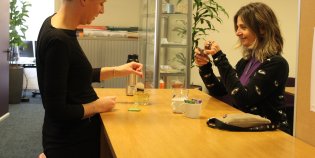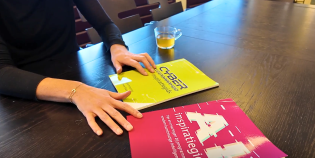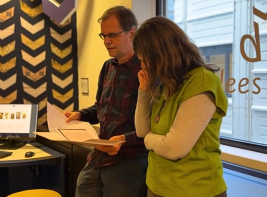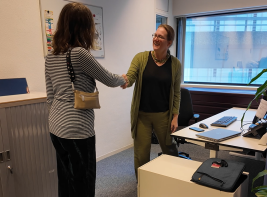In this column, we follow new Director General Wilma van Wezenbeek whilst she is getting to know the KB. Behind the scenes, she meets employees who do important work that not everyone is aware of. It often involves work on an impressive scale. Today: how libraries contribute to all Dutch people being able to participate in our increasingly digitalised society.
Text continues below the video.
Online safety. It's not something you can take for granted. For example, how do you spot fake news? Not to mention the dangers and opportunities of AI. Being able to navigate the online world safely and resiliently is part of what we call digital citizenship. In the Netherlands, there are 96 library organisations offering activities on the subject. They can apply for funding for this through a national programme team led by the KB.
I spoke about this with Marjolein Oomes, our digital citizenship programme manager. She leads the programme team consisting of representatives from public libraries, the POIs (provincial support institutions that support libraries) and the KB. They work together to enable libraries to carry out their role around this important issue.
"Digital citizenship is a broad concept," Marjolein says as we enjoy some tea together. "It's about AI and fake news but also about citizen science – about being able to participate in democracy. And about cyber resilience. Did you know that 2.2 million Dutch people were victims of online crime in 2023? It has many forms: scams, online bullying, stalking. And it can happen to anyone, including me. This programme helps libraries get to work on these issues so that they can in turn help residents in their area. Libraries can apply with the programme team for funding made available by Pica Foundation. We also offer inspiration for these libraries."
Inspiration guides
Marjolein shows me two wonderful inspiration guides: one on AI and the most recent on cyber resilience. "They contain activities that libraries can organise, information on useful tools, tips about speakers, websites, books, podcasts and more. Libraries don't have to reinvent the wheel themselves when they want to work on the topic because a lot is already being done in the network."
Network
"We can only create such a guide with input from the network," Marjolein explains. "Libraries and POIs know what works and what doesn't. In the cyber resilience guide, for example, you can read about an action day against cybercrime in the East Netherlands region. Nineteen libraries participated in this under the leadership of their POI, Rijnbrink and in collaboration with the police. Activities included a walk-in consultation with a neighbourhood police officer, a workshop on safe online banking, and cyber bingo. It’s a great example of how libraries can help people. We are now talking to the national police about how libraries can also contribute to similar campaigns elsewhere in the country."
Professional expertise
Marjolein explains that the programme she runs also focuses on developing professional expertise. "It is often difficult for small library organisations to free up someone for digital citizenship. To make this possible for these organisations, there is a special funding scheme and we also offer training courses. Many of these trainings are also included in our learning landscape: an overview of training courses library staff can take."
When will the programme be considered a success? "When there is no more inequality in the Netherlands in this area – when everyone can take advantage of opportunities in the digital field. Because these days there is a lot of focus on the risks we face out there, but let's not forget that a lot of great things are actually possible online. And we hope that this programme leads to it becoming natural for all library organisations to participate in this."
How fantastic would it be if all 133 Dutch library organisations participated? So, for all libraries reading this: a new round of applications for funding starts on 13 January.




